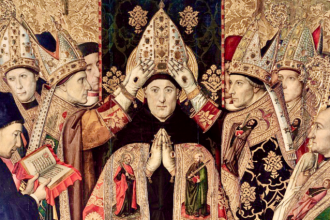Regis Martin
What was it about Augustine’s “Confessions” that made it so readable, or managed to endear its author to so many who read it? Might its appeal have had something to do with the fact that here was a great sinner who lived to regret his sins, and so completely reform his life as to become a great saint?
In the space of three centuries following the death of Christ, two very different threats arose to bedevil the life of the Church. The first was persecution, which took fierce and resolute form right from the start. Wave upon wave of hatred was directed at those who persisted in the practice of the Christian Faith—not only from the Jews, who bitterly resented the fact that the followers of Jesus left the worship of the temple for the sake of a “blasphemer” whose execution they had welcomed, but from Imperial Rome as well, whose fury unleashed itself upon all who refused to honor the household gods. And because the gods were seen as immortal, and the Roman state no less so, any impiety shown to the presiding deities was seen as an attack upon the sacred office of the emperor himself, thus punishable by death.
But all that came to a surprising end with the conversion of Constantine, whose Edict of Milan, in 313, conferred legitimacy upon the Church, thus allowing Christianity to become for the first time in history what God had intended for His Bride from the beginning: a people united, as St. Augustine would later say, by the things for which they had a shared love.
Yet, notwithstanding the end of the official campaign by pagan Rome to exterminate its enemies, there was yet another threat, far more insidious and systemic, which has never really gone away. Like an old penny that keeps turning up to debase the currency of true belief, » Read More
https://theimaginativeconservative.org/2025/04/world-st-augustine-regis-martin.html






